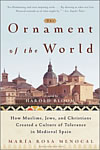The Ornament of the World
by Maria Rosa Menocal
From the 9th to the 15th century, the region we now call Spain was a rich mixture of Arab, Jewish, and Christian cultures that worked together to create a culture of crucial intellectual openness and scope. Much of the legacy of antiquity -- science, mathematics, philosophy -- reenters Western history through Cordoba and Toledo, places where mosques became churches and where churches were decorated with Arabic writing because Arabic writing looked so good. Jews became viziers, Christian princes became knight-defenders of Moslem cities, and Christians from every corner of the old Empire came to study astronomy and theology, to learn from Ibn Rushd (Averroes) and Musa ibn Maymun (Maimonides). The memory of this era had an extraordinarily long life: when the prosperous German Jews of Manhattan built new synagogues in the 19th century, the architectural style for which they reflexively reached was the 10th century mosque.
That al-Andalus might serve as a better model for our future than, say, the Balkans, makes Menocal's volume one of urgent political interest. What Menocal, curiously and distressingly, fails to explain is why this amity fell apart. Why did Spain expel the Jews in 1492, and then expel the conversos and moriscos who chose their homeland over their religion? How did minds close, and why? The answers here -- epedimic and puritan outsiders -- are unsatisfactory because they aren't causal. There are always closed-minded puritans: why did they suddenly and permanently rout the scholars and statesmen?
Menocal teaches us to sympathize with and appreciate the generations when things went right, but she has neither sympathy nor, it seems, much interest in the people and the forces that drove Spain, and all of Europe, so horribly wrong.
